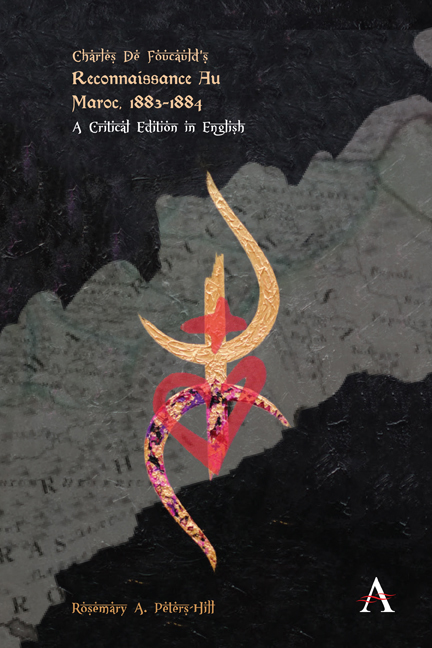Book contents
- Frontmatter
- Contents
- List of Figures
- Acknowledgments
- “There are no roads”: Charles de Foucauld’s Reconnaissance au Maroc—a Critical Introduction
- Charles de Foucauld, Reconnaissance au Maroc, 1883–1884
- Letter to François de Bondy
- Introduction
- Avant-Propos
- I Tangiers to Meknès
- II Meknès to Qaçba Beni Mellal
- III Qaçba Beni Mellal to Tikirt
- IV Tikirt to Tissint
- V Sojourn in the Sahara
- VI Tissint to Mogador
- VII Mogador to Tissint
- VIII Tissint to the Dadès
- IX The Dadès to Qçabi ech Cheurfa
- X Qçabi ech Chorfa to Lalla Maghnia
- Appendix: The Jews of Morocco
- Note on the Materials Used to Draw Up My Itinerary
- Report Delivered to the Société de Géographie de Paris in Its General Session of 24 April 1885
- “Itineraries in Morocco”
- Afterwards: An Afterword
- Glossary of Terms
- Bibliography
- Index
Report Delivered to the Société de Géographie de Paris in Its General Session of 24 April 1885
Published online by Cambridge University Press: 20 January 2022
- Frontmatter
- Contents
- List of Figures
- Acknowledgments
- “There are no roads”: Charles de Foucauld’s Reconnaissance au Maroc—a Critical Introduction
- Charles de Foucauld, Reconnaissance au Maroc, 1883–1884
- Letter to François de Bondy
- Introduction
- Avant-Propos
- I Tangiers to Meknès
- II Meknès to Qaçba Beni Mellal
- III Qaçba Beni Mellal to Tikirt
- IV Tikirt to Tissint
- V Sojourn in the Sahara
- VI Tissint to Mogador
- VII Mogador to Tissint
- VIII Tissint to the Dadès
- IX The Dadès to Qçabi ech Cheurfa
- X Qçabi ech Chorfa to Lalla Maghnia
- Appendix: The Jews of Morocco
- Note on the Materials Used to Draw Up My Itinerary
- Report Delivered to the Société de Géographie de Paris in Its General Session of 24 April 1885
- “Itineraries in Morocco”
- Afterwards: An Afterword
- Glossary of Terms
- Bibliography
- Index
Summary
There is a State, bordering a French department, where the European traveler in general, and the French traveler in particular, has never been welcome. This State is Morocco. Our maps and geography textbooks show us a vast territory that they attribute as the domain of the sultan of Morocco. European geographers have thus sought the simplest expression to put into words an uncertain, variable, and muddled state of affairs; without suspecting it, they have thus been for more than 100 years the accomplices of a fiction. For the sultan of the Maghreb, this emperor of the Muslim west, is not by a long shot the temporal sovereign of the entire country marked with his colors on our atlases. On the contrary, if we take his sovereignty in a spiritual light, then not only are the maps correct, but also we would have to extend the boundaries of his diocese to such an extent that nobody, neither in Paris nor in Constantinople, would accept that the sultan of Morocco might overturn a pastoral mandate or judicial decision given in Algiers, Tunis, Tripoli or Benghazi, cities of which he is nonetheless supreme judge or ruler; and where logic would dictate that each mosque, during Friday public prayers, should call down the benedictions of heaven not onto the president of the French Republic, nor onto the padichah of Constantinople, but indeed onto the sultan of Morocco, who is at the same time the great imam of all Malékite Muslims.
But the Morocco of today is no longer, not by a wide margin, what it was 250 years ago, when (between 1590 and 1660 approximately) the ruler of Fez sent his armies and pronounced his law even unto the banks of the Niger and in the Bâguena and the Tagânt, to the north and close to Senegal. That era has evaporated, and whoever knows Morocco's current situation will not understand the dream of its government, which apparently seeks to reclaim its expired rights over Timbucktu and Djinni. Without being indifferent to progress, nor unaware of recent events, the heir of the sovereigns of Fez, at the end of the nineteenth century, is dominated by a dilemma resulting from a long history;
- Type
- Chapter
- Information
- Charles de Foucauld’s Reconnaissance au Maroc, 1883–1884A Critical Edition in English, pp. 395 - 404Publisher: Anthem PressPrint publication year: 2020



